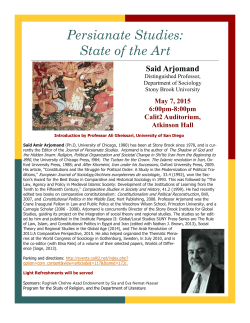
YCC Conference 2015 Program Thursday, April 16, 2015 Opening
YCC Conference 2015 Program Thursday, April 16, 2015 Opening Reception, 5:30 pm – 7:30 pm, FSU College of Law Rotunda Friday, April 17, 2015 All-day Conference, 8:15 am – 5:30 pm, FSU College of Law (BK Roberts Building) 8:15 am – 8:45 am Check-in and Continental Breakfast – Room 310 8:45 am – 9:00 am Opening and Welcome – Room 310 9:00 am – 10:30 am Panel Sessions I 1.A Corporate Governance Moderator: Christoph Henkel Room 331 1.B Privacy, Surveillance, and the Internet Moderator: Holning Lau Room 208 Ahmad Alshorbagy, Alexandria University Faculty of Law, Egypt, CSR and the Arab Spring Revolutions: How Is CSR Not Applied in Egypt Yong Lim, Harvard Law School, Contemplating Competition Law as Part of the Corporate Governance Arsenal: Lessons from Korea Begum Bulak, University of Geneva, Preventive Surveillance, Data Protection and the Rule of Law in Turkey with regard to European Standards Lung-Sheng Chen, National Chung Hsing University, Taiwan, Indirect Liability under the DMCA and Its Counterpart in Taiwan: A Comparative Study 1.C Legal Transplants and Legal Theory Moderator: Mohamed Arafa Room 210 1.D Constitutional Design Moderator: Sahar Aziz Room 310 Luigi Bruno, McGill University, Reforming by Numbers: the World Bank Induction of Legal Patterns Richard Albert, Boston College Law School, Unwritten Constitutional Norms and Written Constitutions Brian Dennison, Ugandan Christian University, The Curious Case of ‘Smith Dakota v. North Carolina’: The Pathology of a Bad Cite in East Africa David Landau, Florida State University, A Weak Vision of Structural Constitutional Law Zachee Puoga Tinhaga, University of Michigan Law School, Fiduciary Duties of Corporate Directors: A Comparative Study of the U.S. Corporate Law and the Organization for Harmonizations of Business Law in Africa (OHADA) Yun Soo Shin, Harvard Law School, Breach of Trust: Corporate Governance Enforcement in Korean Criminal Court Tim Cochrane, University of Pennsylvania Law School, “Digital Strip Searches” at the Border: Critiquing the Approaches of the United States and United Kingdom Hsiang-Yang Hsieh, National Taipei University of Technology, Sharing, Forgetting, and New Primacy Norms: A Comparative Look Sara Hourani and Farah Youseph, Bournemouth University, UK Unpacking the Concept of Good Faith in Islamic Commercial Contracts: Some Analytical Comparisons with the Concept in English Contract Law Katharina Isabel Schmidt, Yale Law School, De-Naturalizing ‘American Legal Exceptionalism’: Early 20th Century Trans-Atlantic Divergences and Contemporary Comparative Law Scholarship Eugene Mazo, Wake Forest University, Constitutional Sequencing Yaniv Roznai, New York University, Temporal Unamendability: A Study of the Prohibition on Amending Constitutions During States of Emergency Ozan Varol, Lewis & Clark Law School, Constitutional Stickiness 10:30 am – 10:45 am Coffee Break 10:45 am – 12:15 pm Panel Sessions II 2.A The Judiciary and the Public Good Moderator: Eugene Mazo Room 310 2.B Comparative Criminal Law and Criminal Law Reform Moderator: Victoria Shannon Room 331 2.C Comparative Constitutionalism Moderator: Yaniv Roznai Room 208 2.D The Common Law: Tradition and Innovation Moderator: Kristen Barnes Room 210 Marcella Ferraro, Federal University of Parana, Brazil, The Possibilities and Limitations of Mohamed Arafa, Alexandria University Faculty of Law, Egypt & Indiana University Rehan Abeyratne, Jindal Global Law School, India, Contrasting Neighbors: Rethinking Judicial Christopher French, Penn State Law, Insuring America’s Uninsured Natural Catastrophes: 2.E Comparative Perspectives on Chinese Corporate Law Moderator: Tahirih Lee Room 241 Tamar Groswald Ozery, University of Michigan Law School, China and Its Controlled Capital Structural Injunctions in Brazil Tiago Fidalgo de Freitas, European University Institute, Constitutional Welfare Rights Adjudication and Institutional Constraints Zoe Niesel, Wake Forest University, The Mythos of Jurisdictional Retaliation Se-shauna Wheatle, Durham University, Uk, ‘Principled’ Reasoning in Fundamental Rights Adjudication McKinney School of Law, Judicial Corporal Punishment in the United States (Again)?! Lessons from Islamic Criminal Law for Curing the Ills of Mass Incarceration Johanna Göhler, Yale Law School, "Busy Defendants and Phantom Trials: Rethinking the Defendant's Attendance Requirement before the ICC Melinee Kazarian, University of Portsmouth, The Role of the Criminal Law in the PIP Breast Implant Scandal: Lessons from France Independence in India and Sri Lanka Landslides Markets: A Comparative Perspective on the Problems and Prospects for Shareholder Activism Rishad Chowdhury, University of Chicago Law School, Apples and Oranges Docket Control and the (Surprising) Lessons the US and Indian Supreme Courts Can Offer Each Other Sujata Gadkar-Wilcox, Quinnipiac University, Constitution Formation as a Moment of Possibility: The United States Constitutional Convention (1787) and the Constituent Assembly of India (1946–1947) Zsuzsanna Gedeon, New York University School of Law, The Empowering Function of Constitutions in a Comparative Perspective Dan Priel, Osgoode Hall Law School, Canada, Conceptions of Authority and Common Law Convergence, and the Future of the Common Law World Virginia Harper Ho, University of Kansas, Control-Based Liability in Chinese Corporate Groups: A Comparative Perspective Jun Shimizu, UCLA School of Law/ Chuo Law School, Japan, Common Law Constitutionalism and its Counterpart in Japan Chang Liu, Harvard Law School, Divided in Theory Converging in Practice: Comparing Corporate Veil Piercing in China and U.S. with Empirical Analysis Wei Wen, University of New South Wales, How American Common Law Doctrines May Inform Mainland China to Achieve Certainty in Land Sale Contracts Chenglong Lu, Zhejiang University, China, MultiParty Governance of the Stock Market and the Reform of China’s Securities Law: Recognition, Recombination of Key Governance Variables, and Entities’ Comparative Advantages Francois-Xavier Millet, University of the French West Indies, Do Federal Constitutions like Local Constitutions? A Comparison between Germany, Switzerland, the United States and the European Union 12:15 pm – 2:15 pm Plenary Panel and Lunch, Room 310 (David Landau) Joshua Braver, Yale University, Hannah Arendt in Venezuela: Huge Chavez versus the Supreme Court over the Creation of the 1999 Constitution Mario Alberto Cajas Sarria, Icesi University Law School,The Supreme Court of Colombia, 1910–1991: Judicial Review in Political and Historical Perspective Rolando Garcia Miron, Stanford Law School, Tesis de Jurisprudencia: An Analysis of the Mexican System of Judicial Precedents Vanice Valle, Estacio de Sa University, Brazil, Dialogic Constitutionalism Manifestations in the Brazilian Judicial Review Juliano Zaiden Benvindo, University of Brasilia, Constitutional Moments and Constitutional Thresholds in Brazil: Mass Protests and the Rise of Pluralism 2:15 pm – 3:45 pm Panel Sessions III 3.A Constitutions 3.B Marriage and the 3.C Common Law and Religion Family and Civil Law in Moderator: Jill Moderator: Dan Priel Comparison 3.D Law, Governance, and Legal Reform 3.E Financial Regulation and Commercial Law Goldenziel Room 310 Room 331 Moderator: Sally Richardson Room 208 Moderator: Sujata Gadkar-Wilcox Room 210 Moderator: Virginia Harper-Ho Room 241 Kristen Barnes, University of Akron School of Law, Minorities, the Right to Education, and Indirect Discrimination Claims Moustafa Alameldin, Indiana University, The US International Public Policy in Front of Islamic Family Law Traditions Felix Chang, University of Cincinnati College of Law, Roma Integration and Inclusion: The Views from Central and Southeastern Europe Holning Lau, University of North Carolina, Remedial Grace Periods as Judicial Strategy: Marriage Equality in the United States, South Africa, and Beyond Rodrigo Camarena Gonzalez, Macquaire Law School, Australia, From Jurisprudence Constante to Stare Decisis: The Migration of the Doctrine of Precedent to Civil Law Constitutionalism Carlo Vittorio Giabardo, University of Turin, Enforcement of Judgments and Role of the Judge in Comparative Perspective: Common law vs. Civil Law Tradition Timothy Kuhner, Georgia State University, American Plutocracy Christoph Henkel, Mississippi College School of Law, The End of the Waterfall: Too Big to Fail, Too Big to Bail or The Role of Central Counter Parties in Over-The-Counter Derivative Market Reform Flora Huang, University of Leicester, New York vs. Hong Kong – A Burst of Regulatory Competition: The Listing of Alibaba Stefanus Hendrianto, Santa Clara University School of Law, Religious Freedom, Liberal Constitutionalism and the Common Good: On Hobby Lobby and S.A.S v. France Jodi Lazare, McGill University, Ensuring Economic Equality Across Provincial Borders: An Appeal to Comparative Law Julie Rocheton, University of Michigan Law School, The Structure of the American Civil Code in Comparison of the Napoleonic Code Umar Rashid, University of Management and Technology, Pakistan, Towards a Theoretical Framework for Understanding Property Regime Transitions: Case Study from Indian Subcontinent and Pakistan Dian Shah, University of Malaya, Constitutionalizing Religion and Religious Freedom: A Comparative Regine Tremblay, University of Toronto, Sans foi, ni loi: Appearances of Conjugality and Lawless Sara Ross, Osgoode Hall Law School, Canada, Legislating Tolerance: A Comparison in Treatment Between Civil and Tom Brower, University of Virginia, Constitutions as Counter-Curses: Revenue Allocation Institutions and the Shubhankar Dam, Singapore Management University School of Law, Interrupting the Will of the People: Presidential Assent in Comparative Perspective Hanaan Balala, Institute of Islamic Banking and Finance, Islamic Finance within a Global Economy: Towards a Common Sustainable Future Yi Zhou, University of Michigan Law School, This Time’s for Real: Establishing an Explicit Deposit Insurance System Study of Paths and Outcomes in Three Asian Jurisdictions Love Common Law Traditions Resource Curse in China 3:45 pm – 4:00 pm Coffee Break 4:00 pm – 5:30 pm Panel Sessions IV 4.A Judicial Review Moderator: Stefanus Hendrianto Room 310 Hasan Dindjer, Harvard Law School, NonJusticiability and “Political Questions” in the US and UK 4.B Private Law: Procedure and Remedies Moderator: Zoe Niesel Room 331 Marco Cappelletti, Punitive Damages and the Public/private Distinction. A Comparison between the United States and Italy Shoaib Ghias, UC Berkeley School of Law, Defining Shari‘a: Stoning and the Politics of Islamic Judicial Review Tobias Lutzi, University of Oxford, Slander Boldly, Something Always Sticks: Problems and Solutions of Private International Law in Cases of Internet CrossBorder Defamation Jurgen Goossens, Ghent University, Belgium, One Victoria Shannon, Washington & Lee 4.C Human Rights and Ethical Issues Moderator: Tim Kuhner Room 208 4.D Authoritarianism, Revolution, and Transitional Justice Moderator: Ozan Varol Room 210 Surabhi Chopra, Chinese University of Hong Kong, New Asian Welfare Laws: How Are India and Indonesia Legislating Socio-Economic Rights Jill Goldenziel, Boston University and Harvard University, When Law Migrates: Refugees in Comparative Law Sahar Aziz, Texas A & M School of Law, Theater or Transitional Justice in the Aftermath of Egypt’s 2011 Uprisings Zeina Jallad, The Power of the Body: Analyzing the Ahmed El-Sayed, University of Copenhagen, Constitutional Repeats Itself: Can Turkey Be the Model? A Comparative Analysis between Turkish and Egyptian Constitutional Experience Post Military Coups Alyssa S. King and Alvin Y.H. Cheung, U.S. Court of and Twin Peak Models. Impact of Court System on Uniformity of Administrative Justice. University School of Law, Judging Third-Party Funding Corporeal Logic of Law and Social Change in the Arab Spring Appeals for the Second Circuit/New York University, Hong Kong as Devolution Problem Fritz Siregar, University of New South Wales, Political Context for Judicial Review: Indonesia Experience Richard Li-dar Wang and Shao-ting Hong, National Chiao Tung University, Taiwan, Mental Element of Patent Infringement in Taiwan Jane Rooney, Durham Law School, UK, Human Rights Abroad: Comparing and Contrasting Approaches from the Unites States Supreme Court, the Canadian Supreme Court and the European Court of Human Rights Konstantin Tretyakov, Harvard Law School, Euthanasia and PhysicianAssisted Suicide in China and the United States: What a Comparative Analysis Has to Offer Erin McGrath, University of Pittsburgh, Deliberative Authoritarianism Through Participatory Constitutional Reform Under the AKP in Turkey, 2007 to Present Li Zhiyu and Benjamin Chen, UC Berkeley School of Law, Explaining Comparative Administrative Law: The Standing of Positive Political Theory
© Copyright 2025









